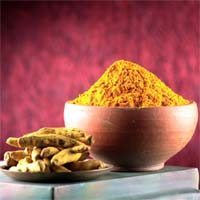Spice Compound Extends Mesothelioma Survival in Mice
 The compound that gives the spice turmeric its yellow color and pungent flavor is once again attracting the attention of mesothelioma researchers.
The compound that gives the spice turmeric its yellow color and pungent flavor is once again attracting the attention of mesothelioma researchers.
Curcumin has been the subject of numerous mesothelioma studies. The latest one, conducted by scientists at the Department of Experimental Medicine at the University of Rome, finds that the compound has the power to not only kill mesothelioma cells in the lab, but to also extend survival in mice infected with the asbestos cancer.
Curcumin in the Treatment of Mesothelioma
Curcumin is a plant-derived polyphenol with anti-inflammatory and antioxidant properties. It can be taken in pill form and, unlike most drugs that treat malignant mesothelioma, has virtually no side effects.
The new Italian study tests curcumin’s potential value as a mesothelioma treatment in two ways. First , the compound was applied to several different human mesothelioma cells lines and to mouse mesothelioma cells in the lab (in vitro). The results were significant.
“Curcumin in vitro inhibited malignant mesothelioma cells survival in a dose- and time-dependent manner and increased reactive oxygen species’ intracellular production and induced DNA damage,” writes researcher and lead author Dr. Laura Masuelli in the medical journal Oncotarget.
Reactive oxygen species are chemically reactive particles that contain oxygen. Although they are a natural byproduct of metabolism, a significant rise in ROS can damage cells. The same is true for DNA damage, which makes it impossible for cells, including mesothelioma cells, to replicate successfully.
The combination of damaging effects triggered a process of cellular death among mesothelioma cells in the lab called apoptosis.
Testing Curcumin in Live Mice with Mesothelioma
The second way in which the Italian research team tested the mesothelioma-fighting properties of curcumin was to administer it to live mice that had been infected with human peritoneal mesothelioma.
When curcumin was administered directly into the peritoneal cavity, the space between the membranes that surround the abdominal organs, the mice had a longer median survival time. Equally significantly, curcumin appeared to reduce the risk of developing new mesothelioma tumors.
“Our findings may have important implications for the design of malignant mesothelioma treatment using curcumin,” the report concludes.
Curcumin as an Alternative Mesothelioma Therapy
In 2015, mesothelioma researchers with Flinders University in Australia determined that curcumin had the ability to keep mesothelioma tumors from giving rise to their own new blood vessels. It was suggested that curcumin could become a supplemental treatment for certain mesothelioma patients.
In another 2015 study, Italian researchers found that curcumin was even more effective when delivered into mesothelioma cells via nanoparticles, which overcame the cells’ natural resistance to the compound.
Alternative mesothelioma therapies like curcumin are of particular interest to mesothelioma researchers because of the cancer’s resistance to standard treatments. As many as 2,500 people died of mesothelioma in the US each year.
Sources:
Masuelli, L, “Curcumin blocks autophagy and activates apoptosis of malignant mesothelioma cell lines and increases the survival of mice intraperitoneally transplanted with a malignant mesothelioma cell line”, January 30, 2017, Oncotarget, Epub ahead of print





